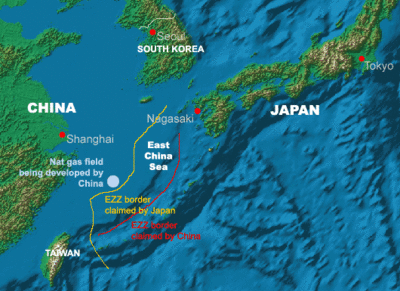The materials below are mainly from a report in Chinese found on finance.sina.com.cn on October 12th, 2005. According to Sina, the report was originally published on Chinese industry and commerce Times written by reporter Wen Xue Mei

Sino-Japan East China Sea oil-gas field confliction has led to the tense situation. The third round of consultation was not fruitful. Japan suggested reopening the new consultation on 19th, this month, and raising the consultation to the ministerial level. Although China has not yet responsed, China and Japan are anticipated to reopen the talk before the end of this month. The expert reminds that Japan has changed its strategy from a strong offensive position to a murderous-intention-concealed flexible offensive position in this negotiation. The cooperative development plan suggested by Japan is a hidden sword. In fact, on the East China Sea problem, China proposed a cooperative development plan back in 1960’s. In 2004, China proposed the plan to Japan again in East Asia 10 + 3 energy ministerial conference, the third session of Asia conversational conference as well as many other kinds of situations. But Japan ignored the proposals and requested China to provide the mining data of Chunxiao and other 7 related oil-gas fields. China rejected Japan for obvious reasons. In this May, in the second round of consultation, China once again proposed the plan, Japan again rejected it.
That’s why it is interesting that, in the third turn of consultation, Japan suddenly proposed his own cooperative development plan. This plan suggested both sides should cooperate in the development of East China Sea, however, China has to stop the operation in Chunxiao oil field and send Japan the data of exploration in Chunxiao and so on.
Lv YaoDong, a researcher from Chinese Academy of Social Sciences Japan research institute, considers this as a transition from the strong offensive position to a more flexible offensive position in Japan’s negotiation strategy. However, the Japanese version of cooperative development plan contains an extremely dangerous intention towards China’s interests.
First of all it is the sovereignty issue. China is exploring its own territory and the oil-gas drilling is completely inside its own sovereignty scope. However Japan’s plan takes China’s exclusive economic zone as a stake in the negotiation. Obviously the real intention of Japanese is to force China to accept the middle line theory and hope to make a even bigger breakthrough in sovereignty issue.
Secondly, Japan uses its own cooperative development plan to request China to provide the mining data of Chunxiao and other 7 related oil-gas fields inside China’s EEZ. The mining data contain information about geology and landscape of East China Sea. Relying on these materials, Japan may ask for the sovereignty power of the East China Sea in 2009 at the United Nations. (In May of 1999, the United Nation continental shelf boundary committee formulated the new standard, which regulated the application deadline for various countries attempting to extend their continental shelf is 2009.) As the time approaches this deadline, Japan is doing everything possible to investigate East China Sea. However because China started the process earlier, Japan is eager to obtain these data. But if Japan force to explore this region, it may lead to accidents with Chinese Navy, therefore, the easiest way for Japan to get these data is through the diplomatic method in the disguise of the cooperation banner.
Thirdly, Japan wants to occupy the Chinese Diaoyu Islands forever by forcing China to accept the middle line theory.
China must be in sharp opposition to Japan’s strategy and persist the principle of sovereignty.
Japanese prime minister once advocated to turn East China Sea "a sea of dispute" into "a sea of united efforts". Some Japanese officials also expressed such a wish. But, from a series of actions regarding to the East China Sea, Japan in fact is constructing a trap and China must maintain the vigilance.
Yao Dong suggested that since Japan did not express any sincerity as it proposed and even tried to use China’s own EEZ as a stake in the third round of negotiation, China should also adopt the certain diplomatic strategy in sharp opposition to the development plan that Japan proposed. For example China may request the rights to develop the region extending to LiuQiu trench (Ryukyu trench). It has been reported the oil & gas resources mainly concentrates in the three spots on the continental shelf. One is the middle region of the continental shelf; one is around the Diaoyu Island. The other is in Ryukyu trench. Without the sincerity from Japan, it will not be helpful to consider ministerial level negotiation with Japan in the end of this month.
Japan's land territory is relatively small, but by applying the concept of 200 nautical miles economical exclusive zone, Japan has already become the world 6th largest country by its claim of the sea sovereignty. The method used by Japan to enlarge its territory is nothing but extreme. For instance, as a reef itself, the ChongNiao reef should not have its own EEZ, but Japan utterly used the cement to turn it as a small island, and claim 200 nautical mile EEZ from this cemented reef, which is obviously unjustified.
Facing this kind of expansion strategy, one may expect, China and Japan will have a prolonged fight in East China Sea. What is China's strategy to the conflict? Some expert suggested solving the problems from the easiest to the hardest. Some other expert considered a compromise between the middle line theory and the continental shelf theory. But Yao Dong doesn’t think the problems in those ways. Instead of a technical question or a legal problem, Yao Dong considers it as a political conflict and China must be firm on this problem. China has to realize that Japan's goal is to seize China’s continental shelf. By simply resorting to the existing law to delimit the continental shelf is not fair enough in this particular situation. It is ridiculous to share the continental shelf with Japan because a chain of islands is treated equally as comparison with the massive continent of China.
There are already some proposals from senior diplomats which suggest China thinking the sovereign status of Ryukyu Islands again. Yao Dong agrees that the real status of the Ryukyu Islands may help to completely nullify the middle line theory and will eventually help China to solve the East China Sea conflict from the bottom. We must put our vision to the entire East China Sea, Yao Dong said. Facing the national sovereignty, the top principle is following the principle.
Check the
earlier heated debate on this blog for the further information, and
more
more











